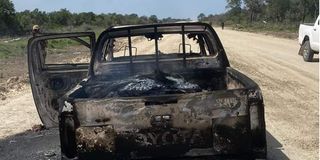Risk versus cash: The allure of Lapsset jobs as Al Shabab lurks in wait

One of the vehicles burnt in an attack by suspected Al-Shabaab militants on the Lamu-Garissa Lapsset road on Tuesday.
On paper, the Lamu Port South Sudan Ethiopia road is one of Kenya’s biggest projects aimed at opening up northern Kenya, a vast area whose vast economic potential is yet to be tapped because of infrastructure challenges.
But in some areas in Lamu, Tana River and parts of Garissa counties where the road cuts through is a heartless land, a dangerous jungle where marauding Al-Shabaab gangs have recently been calling the shots.
The road project, which is part of the Sh17.9 billion Lamu Port-South Sudan-Ethiopia-Transport (Lapsset) Corridor project, has a total length of 453 kilometres.
Apart from the 257km Lamu-Ijara-Garissa stretch, the project also comprises the 113km Hindi-Bodhei-Basuba-Kiunga road and the 83km Ijara-Sanghailu-Hulugho section, all of which cut across the terror-prone Boni forest region that straddles the three counties. The entire project is being constructed by the China Communications Construction Company (CCCC).
Attacks using Improvised Explosive Devices (IED), Rocket Propelled Guns have made the road one of Kenya’s most dangerous as insecurity posed by Al Shabaab keeps growing.
The series of attacks targeting security vehicles started in 2017, according to investigations by Nation.
The Lapsset road is suspected to be filled with improvised explosive devices, making it dangerous, even to the military or security agencies traversing this route.
Swabir*, not his real name, has been working on the road project in Garissa for the last three months.
He wakes up at 5.30am and proceeds to start his daily routine.
“The food cooked is split into three. Dinner, breakfast and the other leftovers, which I carry with me to work for lunch. This is because the area we work in is far from our residential places. Also, at the construction sites there are no food stalls that we can depend on,” says Swabir.
After his breakfast, he proceeds to work where they are ferried by various vehicles.
By 6.30am they are expected to be at their respective workstations.
“Excuses are not allowed. If you are late, you are sent back home. If for instance a car you were driving gets a puncture because roads are bad you get reprimanded,” he adds.
He says from the residential areas to the construction sites is approximately 20 kilometers through lush green vegetation and forested area on both sides of the road.
Swabir reveals most of the workers, aside from the recurrent attacks by the Al-Shabaab militants, fear the bosses since they harass them. Another challenge they face is the harsh weather conditions.
“The jobs are up for six-month renewal contracts. Majority do not complete the term as they do three consecutive months and give up in between,” says Swabir.
But why would anybody risk their lives and choose to work there?
“The jobs pay a lucrative sum of money. We have categories and each has a different pay. An engineer is paid more than Sh100,000 while mechanical technicians, drivers and others are paid between Sh40,000 to Sh50,000,” he says.
They leave the working stations around 4pm and arrive at their residential areas around 6.30pm.
Following recent numerous attacks by suspected Al-Shabaab militia groups, Kenyans have taken to social media ranting out the ‘dangers’ that the Lapsset corridor access road pauses.
Last week, a roadside explosive killed three Kenya National Highways Authority (Kenha) engineers after the vehicle they were in hit an Improvised Explosive Device (IED) on the Lapsset road.
In December, about six kilometers from a Chinese construction site on the LAPSSET project in Bura East, Garissa County, a vehicle was hit by a rocket propelled grenade after missing a roadside explosive, two people died, a police officer and a civilian.
In January 2021, Lapsset road construction works had to be suspended for over three months owing to rising cases of terrorist attacks. Later in March after heavily armed Al-Shabaab militants ambushed a site in Majengo area of Boni forest and killed five construction workers and injuring three.
The assailants also burnt down construction vehicles and several motorcycles belonging to casual labourers.
Lamu West Deputy County Commissioner Gabriel Kioni said the government has done all it takes to ensure the few select areas where incidents of terror attacks along the route have been witnessed are secured.
Mr Kioni, however, blamed a section of wananchi who he accused of providing hideouts for the enemy every moment they conducted attacks.
He said they have exerted much of their efforts in gathering intelligence within the concerned areas to help combat the enemy.
He said incidents of recurrent attacks on the concerned areas will only be eliminated if members of the public will fully cooperate with the security agencies by providing information that will aid in the war on terror.
“In places like Nyongoro, we have the GSU and special forces officers operating there. The problem we’ve seen is that the enemy always ‘evaporates’ within minutes after conducting attacks. We believe the enemy isn’t from far. They are operating from within, and someone is even helping them to maneuver. We call on mwananchi to avoid hiding criminals. Let them provide information so that the enemy can be completely eliminated from this place,” said Mr Kioni.
At a meeting with Lamu leaders on Wednesday, Interior Cabinet Secretary Kithure Kindiki pledged that the national government will move with speed to ensure crucial issues contributing to Lamu insecurity are fully resolved.






